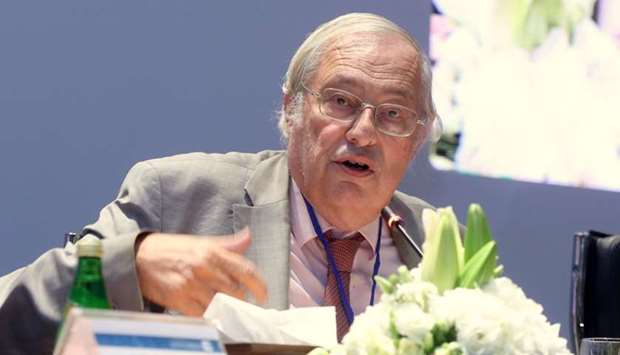Delivering the keynote lecture at the opening of the fourth annual Gulf Studies Forum on Saturday, Bertrand Badie said: “Of course, the Gulf crisis is a global crisis. Of course, it is a major global event in the international relations. Of course, it is affecting the international arena and international system."
The three-day forum, organised by the Arab Centre for Research and Policy Studies, is being held at the Gulf Studies Centre until tomorrow. Its theme is “The Gulf Crisis: Regional and Internal Dynamics and the Role of the Media”.

A section of the audience at the event.
The event is being attended by several Qatar-based experts in international studies as well as delegates from different countries. The forum is looking to deliberate on the Gulf crisis and its causes, contexts and impact through a number of panel discussions and lectures.
Badie highlighted that a number of major changes have taken place in the international system in recent times. “What is the global system now? The powerful is getting powerless. There are no longer any superpowers. A superpower was something that was created and used during the Cold War era and now it is practically impossible to have such a superpower. The powerful is powerless now because new regional powers are more powerful than international powers in the present context,” he explained.
“Another major change is that it is a global place and there is an increasing trend of interdependence between countries in the economic and international system.When there is increasing interdependence, sovereignty, which was the traditional cornerstone of international communities, is challenged but not destroyed,” he added.
According to Badie, there is no "universal system" - the kind of which was prevalent earlier. “Globalisation triggers a new role for local actors. Local actors are the winners of the world in the present system. They are bringing in societal changes. What is emerging is the international social system, rather than the international system. International relations processors are now retired,” he noted.
Further, Badie highlighted that regional powers are the cornerstones of the new international relations order. “New regional powers are emerging in every part of the world. Symbolic resources are more important than material resources in the present world,” he felt.
The international relations expert pointed out that humiliation is a major parameter in the modern international order. “It is a major strategy to dominate the neighbour or as a counter strategy to react against humiliation. All the major players have been humiliated in recent times,” he elaborated.
“Power politics was once considered the cornerstone of international relations. However, weak actors are able to play the main role in the modern era and set the international agenda. This is evident in many of the major international events that have taken place in the last two decades,” he added.

Bertrand Badie speaking at the forum. PICTURES: Jayan Orma
The Gulf crisis is a major global issue, a French political scientist and international relations specialist has said.

